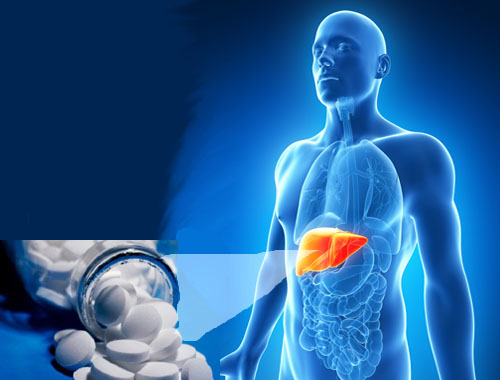Acetaminophen Overdose

Published: 18 Jun 2025
ICD9: 965.8 ICD10: T39.8X1A ICD11: PB24
An acetaminophen overdose happens when someone takes too much acetaminophen, a common pain reliever and fever reducer found in many over-the-counter and prescription medications.
It's dangerous because excessive amounts can overwhelm the liver's ability to process the drug, leading to liver damage and potentially liver failure, which can be fatal.
Here's a breakdown:
![]() Acetaminophen: The active ingredient in medications like Tylenol, Panadol, and many combination cold and flu remedies.
Acetaminophen: The active ingredient in medications like Tylenol, Panadol, and many combination cold and flu remedies.
![]() Overdose: Taking more acetaminophen than the recommended dose within a specific timeframe (usually a 24-hour period). This can be intentional (suicidal intent) or unintentional (accidental, often due to not reading labels carefully or taking multiple medications containing acetaminophen).
Overdose: Taking more acetaminophen than the recommended dose within a specific timeframe (usually a 24-hour period). This can be intentional (suicidal intent) or unintentional (accidental, often due to not reading labels carefully or taking multiple medications containing acetaminophen).
![]() Mechanism of Harm: When taken in normal doses, acetaminophen is mostly processed safely by the liver. However, with an overdose, the liver becomes saturated and cannot break down the drug properly. This results in the formation of a toxic byproduct that damages liver cells.
Mechanism of Harm: When taken in normal doses, acetaminophen is mostly processed safely by the liver. However, with an overdose, the liver becomes saturated and cannot break down the drug properly. This results in the formation of a toxic byproduct that damages liver cells.
![]() Symptoms: Symptoms can vary depending on the amount ingested and the time since ingestion. They can include:
Symptoms: Symptoms can vary depending on the amount ingested and the time since ingestion. They can include:![]()

![]() Early symptoms (within 24 hours): Nausea, vomiting, loss of appetite, sweating, abdominal pain. These symptoms can be mild and easily dismissed.
Early symptoms (within 24 hours): Nausea, vomiting, loss of appetite, sweating, abdominal pain. These symptoms can be mild and easily dismissed.![]()

![]() Intermediate symptoms (24-72 hours): Pain in the upper right abdomen (where the liver is located), jaundice (yellowing of the skin and eyes), and signs of liver damage in blood tests.
Intermediate symptoms (24-72 hours): Pain in the upper right abdomen (where the liver is located), jaundice (yellowing of the skin and eyes), and signs of liver damage in blood tests.![]()

![]() Late symptoms (72 hours to weeks): Liver failure, kidney failure, confusion, coma, bleeding disorders, and potentially death.
Late symptoms (72 hours to weeks): Liver failure, kidney failure, confusion, coma, bleeding disorders, and potentially death.
![]() Treatment: The primary treatment for acetaminophen overdose is N-acetylcysteine (NAC), which helps the liver process the drug and prevents further damage. NAC is most effective when given as soon as possible after the overdose, ideally within 8-10 hours. Treatment also includes supportive care to manage symptoms and complications like liver or kidney failure.
Treatment: The primary treatment for acetaminophen overdose is N-acetylcysteine (NAC), which helps the liver process the drug and prevents further damage. NAC is most effective when given as soon as possible after the overdose, ideally within 8-10 hours. Treatment also includes supportive care to manage symptoms and complications like liver or kidney failure.
![]() Prevention:
Prevention:![]()

![]() Read labels carefully: Pay attention to the ingredients of all medications, both prescription and over-the-counter. Be aware that acetaminophen may be listed as APAP on some labels.
Read labels carefully: Pay attention to the ingredients of all medications, both prescription and over-the-counter. Be aware that acetaminophen may be listed as APAP on some labels.![]()

![]() Follow dosage instructions: Never exceed the recommended dose.
Follow dosage instructions: Never exceed the recommended dose.![]()

![]() Be cautious with combination products: Avoid taking multiple medications that contain acetaminophen at the same time.
Be cautious with combination products: Avoid taking multiple medications that contain acetaminophen at the same time.![]()

![]() Consult a doctor or pharmacist: If you're unsure about the proper dosage or potential interactions with other medications, ask a healthcare professional.
Consult a doctor or pharmacist: If you're unsure about the proper dosage or potential interactions with other medications, ask a healthcare professional.![]()

![]() Keep medications out of reach of children.
Keep medications out of reach of children.
Important Considerations:
![]() Acetaminophen is generally safe when taken as directed. The danger lies in exceeding the recommended dosage.
Acetaminophen is generally safe when taken as directed. The danger lies in exceeding the recommended dosage.
![]() Mixing acetaminophen with alcohol can increase the risk of liver damage. It's best to avoid alcohol while taking acetaminophen.
Mixing acetaminophen with alcohol can increase the risk of liver damage. It's best to avoid alcohol while taking acetaminophen.
![]() Certain medical conditions can increase the risk of liver damage from acetaminophen. People with pre-existing liver problems or who are malnourished should be particularly careful.
Certain medical conditions can increase the risk of liver damage from acetaminophen. People with pre-existing liver problems or who are malnourished should be particularly careful.
![]() If you suspect someone has overdosed on acetaminophen, seek immediate medical attention. Call emergency services (911 in the US) or your local poison control center. Time is critical in preventing serious liver damage.
If you suspect someone has overdosed on acetaminophen, seek immediate medical attention. Call emergency services (911 in the US) or your local poison control center. Time is critical in preventing serious liver damage.
Disclaimer: This information is for general knowledge and informational purposes only, and does not constitute medical advice. It is essential to consult with a qualified healthcare professional for any health concerns or before making any decisions related to your health or treatment.